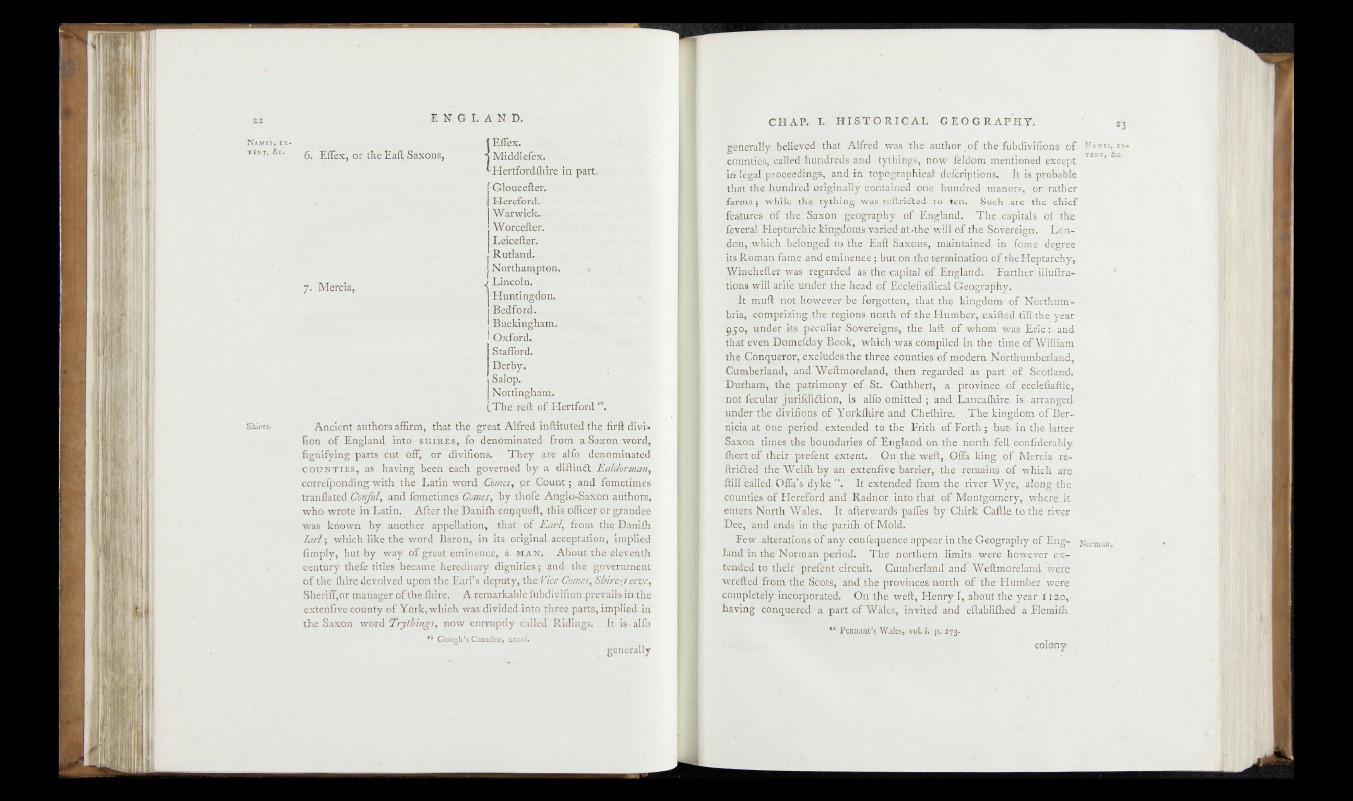
Names, . extent,
&c. ' 6. Effex,rpr.vthe EaftSaxons,
7. IJercia,
-tEffe*; . .
^Hertfordshire In part.
jsGloucefterS’ ■>
J Hereford1. K |
j-Warwick».; ,>
fWdfoeffeR' ' ti
iLefcefter.
I Rutland.^
Northampton. , *
0 Lincoln.
1 Hunti|rg'don;
I Bedford.
Buckingham.
I Stafford.
Derby. -
ISalopd-^
Nottingham^
[.Tiie rcft^of Hertford
Ancient authors a®^ni, that the great-Affoed inftitafed the firft d i^
lion o f England intol jSHi£ES,|p#denompdat£d4frctba *a Saxon w$i;d,
dignifying parts cut offy- dr* cfiMfions. ^‘Ma-Sy: ahe^-aMp-^ d^orninaled
.-co u n t ie s , *as having-beetr eaCH^goye^sed-tby a ditUndt JEaUtixma?!,
■ correfpondkig-with .the - Latin wQrd*^%w®s pr^Cgupt ;5 dfoine.|knes
trapflatfed Qmful^ and
who wrote .in. Latin. After* the Danifh-cojj^udfy fhi’aoffice.dof^randpe
was known—by another appellation,- that of Earlf^om. the Danilh
la r i'i which like the word Baron, in its original acceptation, implied-
(imply, but by way o f great eminence, a m an . About the eleventh
century thefe titles became hereditary dignities; and the government
o f the .{hire devolved upon the Earl’s deputy, the Vice Gomes, Shire-reeve,
Sheriff, or manager o f the-ftiire. A remarkable fubdivifion prevails in the
extenfive county of York, which was divided into three parts, implied in
the Saxon word Wrylbings, now corruptly called Ridings. It is - alfo
10 Gough’s Camden, otxxi. .
genmlly/l-hefieVedjj that Alfred was'Ah®(aJufMot| p f the fobdivifions, o f
", counties, called hundred^-and tythings,- now feldom mentioned except
in legal proceedings, and in topographical deferrptions. It is probable
that the,hundred originally contained one hundred manors,, or rather
farmsj;-,while^fHie tything was.rbtei&ed* to ten. £ Such’ are 'the chief
feahuqs”. p t.th e S i\o n p<ograph'v df *1 n^land. ‘T -h ^ t^ ijta ls o f the
feveral Heptarchic kingdonis.varied at -the will of the Sovereign. London,
which belonged-to the Eaft Saxons, maintained in forne degree
.'iteR ^ adM m d 'a n d dm ih e n c e ; bmonjthd terminationlpf^theHeptarchy^
Winchefter was regarded as the capital of 3 ngland. Furtfififililluftra-
tionsajill^arile .unde,is the,hcadi>f I ' V i d e a l WeogrjaphV'»;i^ •
It mu(hinp&buy, cv11 kingdom* tiff KFoithtiirr4-1
b ria,^femprizingi^h^e.ginp^pp^h-of tehe Humber, e ^ fte d t^ l||h d ‘y ear
950, under #Jv|n.eculiailS«|r;e4^nis|Kthe.' lafij lof twhoHjgfes Eriefe and
that even Dojnefday Bp gib w;hich was compiledfiniljiibsiime of William,
fhe. Conan erojAb J^ u d e s fee three c o u n t p i p d e x n ;N6t$fiupi>b.er]and,
Cumberland,; and ^ e ftg jp rd a n d , then regarded, as part .o f Scotland.
hB u ih am ^ jt^ .i'^ iu io nY ^ o fo S t^C m h b e rU a fefeyipep jof.eeplefiaftic,.
*nQ|»mctwr ju rifiId |io n , lS f/a ffo ^ ^ iftm ; e^i^d Latfcafhire isj,arr’angedt-
upder t l r c ^ f r \ orkfliire- and C h e(|tifa ,i.The}kin.gff*& r4of~Ber-
iilcia atjpfefe,er,iad f a rtended- t n jfeel ■Frifeuri&Fo.tthibutsfiri&tfie latter
Saxon times the -hounclaries of England on the north fell confiderably
fhort of their prefent extent. On the weft, Offa king of Mercia re-
ftridted the WeKh by an extenfive barrier, the remains:, of which, * are
iU U m am ^ ffi's dyke -■ Ft,e^tended,fromjthe, riv^rhWynv’4a^<?b^i
counties eff Hereford and R a d n o ^ n to tHat’wffiMdnfg(|hierj r . u herb it
erdeVs^North Wales. It afterwards^palfcs hy Chirk CaftleItdthe-river
De'6V'tmd*dmfs''lirf the parim.of Aloldr
Few.ialteration% o f any COTfeqpJnce appear in the Gcogiaphy ol England
fin the' Worm an pe’n q d .1 ’ T h e h a ra ie rn limits^ wbieMdweTC ,
tended to their prefent,circuit. ' Cumberland and Weftinorelarid were
wreffed from the Scots, and the provinces no rth of the Humber were
^^pfefdljl'ra&r|)*6'r^tedi jbdTt^e yv'efi',’Henry^ 1, apbufute fW 1120,*
havi'iig conquered- a part of WmeijHlbhbted and“ eftablilhed a Flemifh.
Names, ex>
tent, See;
Norman»'
Pennant's Wales?^qi, h p. 273.